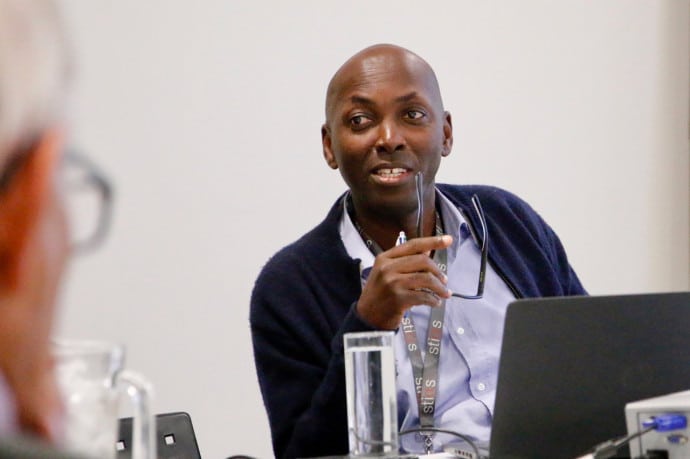“By and large, present-day social-security systems in Africa are failing despite calls from international organisations to extend social-protection cover. We have to ask what can be done and how we can avoid repeating the errors of the past.”
“We need different solutions for different parts of the world. We have to observe and understand local practices to see what’s possible and what’s not. We also need much more comprehensive understanding of the local meanings of terms like solidarity, social risk and protection.”
This is the opinion of STIAS fellow Augustin Emane of the Faculty of Law at the University of Nantes. Emane is undertaking comprehensive research to try to understand the state of social security in Africa by looking in detail at Gabon, Mali and Senegal.

“In these countries the mechanisms of social security put in place following independence are no longer working and they serve as useful examples of some of the challenges in this area,” he said.
Emane believes that the main stumbling block has been the adoption of models from elsewhere (usually Western) which don’t take account of local practices.
“Reality is often complicated which makes it seem easier to just reproduce Western systems.”
“But,” he added. “Africa is 54 different countries. We cannot see it as one homogenised Africa.”
“Social security might only be the interest of a few specialists,” he added, “but it is of huge importance in the lives of many people especially in Africa. Social security is essential in the war against poverty and inequality.”
He pointed out that in the last 20 years international organisations like the World Bank and International Labour Organisation (ILO) have placed increasing emphasis on social security to reduce poverty and, in particular, around the need to extend it globally “But,” he said, “you must have something there that works to extend.”
The ILO convention on social security, which dates back to 1952, and was ratified by 55 countries, includes nine aspects namely: medical care, sickness care, unemployment, old-age benefits, employment injury benefits, family benefits, maternity benefits, invalid benefits and survival benefits.
The African Charter on Human and Peoples’ Rights of 1981 (also known as the Banjul Charter), an international human rights instrument intended to promote and protect human rights and basic freedoms in the African continent, includes the right to social security.
“Social security is also recognised as a human right in all three of these countries,” continued Emane.
“Despite this, Africa remains the continent with the greatest proportion of the population still unable to access adequate healthcare. And, in most countries, only a minimum of the people are actually protected.”
“Added to this, where services exist, the quality is often poor – although this is not just an African problem,” he said.
“Often we find social security embedded in the law but not in reality – these formal rights cannot be implemented because of a lack of funding.”
Emane has already compared the legal framework and the minimum standards across the three countries. He will also undertake interviews with key local people and on-site observation of real social needs.
“We have to work like anthropologists,” he said, “going into each country to see what is actually happening on the ground.”
The study will reflect on social-security coverage in these countries and question the role that law and legislation can play.
But it’s not just about what is already formalised in law. Emane agreed that regulations and laws must reflect the pre-existing reality or they have no chance of success.
“The failure of the social security system is firstly a failure of the state’s reflection on this subject,” he said. “Should the state be considered as the only contributor when we observe other forms of social protection help and solidarity via informal structures? We have to understand the place of existing local practices. This project will study these structures and anticipate how they can be considered within national legislation.”
However, he also emphasised that the existence of community-based social support should not be used to allow states to pass the responsibility of state protection to individuals.
“People have a fundamental right to be protected in society,” he said.
The meaning of words
Emane pointed out that it starts with something as seemingly simple as the meaning of the words.
“We need to understand what the words mean especially in different historical, social and cultural contexts,” he said. “For example, solidarity in English does not have the same meaning as in French or in indigenous African languages.”
“In Africa solidarity exists via links of family, village, ethnic group, trade, age, brotherhood and region,” he added. “It’s not just about risk but also about saving money, project management and helping people.”
“Social risk is at the heart of reflection on social security,” he added. ”But must one stick to the definitions given by the ILO and national legislations or can we not also attempt to expand the notion of social risk to interpretations nearer to the cultural realities of different countries?”
“I believe we have to rethink social risks considering local practices and beliefs. For example, African perceptions of health and illness differ hugely. We need to understand life events within the African context and see if it is even possible to translate this into a legal system.”
He pointed out that we need to ask fundamental questions like what is tradition, what is the role of the state, and what kind of society do we want to live in?
“Ubuntu is a magic word for Africans like me but what does it mean in reality?” he asked.
“The rich ancestral heritage of Black Africa and African legacy and values must be comprehensively understood and taken into account.”
Michelle Galloway: Part-time media officer at STIAS
Photograph: Christoff Pauw
